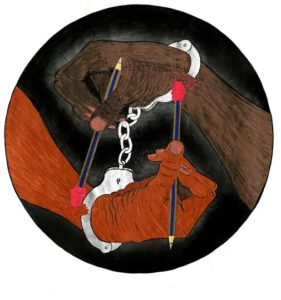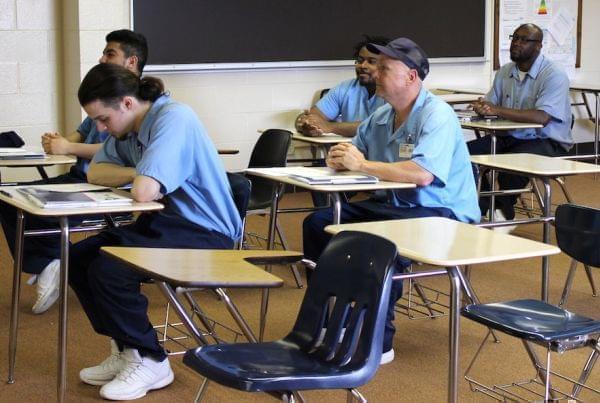PINCKNEYVILLE – The transfers of the students incarcerated at Stateville Correctional Center near Chicago started in August.
Each time DePaul University professor Christina Rivers entered Stateville to teach, more of her students were gone.
“Because I can’t interact with them when I’m not there, I can’t reach out to ask who is leaving. I can’t email them goodbye and so we just came to expect that with each meeting there would be fewer folks,” Rivers said.
Rivers couldn’t bring herself to say goodbye in person either. In her second to last class, her icebreaker question was about what the class meant to everyone.
“Kleenex was needed,” she added.
Stateville Correctional Center had some of the worst conditions of any Illinois prison. Rivers said students have taken tap water out of her hands and gave her their bottled water instead, because they refused to let her drink something so unhealthy. A man died when temperatures reached dangerous levels in his cell.
In the spring, Governor JB Pritzker announced the facility would be torn down and rebuilt.
The Illinois Department of Corrections said in a statement that most of the 109 students enrolled in Stateville’s higher education programs were transferred to a facility that supported what they were doing.
But Rivers noticed about a dozen of DePaul’s students were not transferred to its future site, Hill Correctional Center, in Galesburg.
“They were real consistent participants, who did substantive work and it’s still sinking in,” she said. “I’ll probably never get to work with them again, unless they get out.”
Department of Corrections policy forbids contact between students and professors outside of class
DePaul University has brought incarcerated and free students together to learn as equals with its Inside-Out Prison Exchange Program, starting in 2012.

But the students don’t have equal relationships with their professors.
Illinois Department of Corrections policy does not allow volunteers to “socialize or fraternize with any individual in custody.” They are not allowed to communicate by phone, electronic mail or letter or disclose their contact information.
In an email, IDOC said the policy is designed to ensure the safety of volunteers, individuals in custody, facility staff, and the public.
“It’s all based off a myth. They’re just assuming you’re in prison, so you’re always trying to do something criminal with every conversation,” said Joseph Dole, who was transferred to Pinckneyville Correctional Center in southern Illinois during Stateville’s closure.
Dole would like to see the no-contact policy abolished. He said it dehumanizes those in prison and it hampers the communities that allow people to successfully reenter society when they are released.
“If I get out tomorrow, who do you think is going to help me get on my feet and be a part of the community and help solve social issues?” Dole pointed out.
In 2000, he was convicted of murder based on an Illinois law that holds people accountable for the actions of others. He has maintained he is innocent.
While serving his life sentence, Dole has completed a bachelor’s degree, co-founded a nonprofit, published three books and authored bills for the Illinois legislature.
A lot of us are making up for shitty lives we were leading out there. We were on the streets and doing whatever stupid things as kids,” he said. “Now we’re more community minded. We’re more focused on the health of the community, society, civil rights and stuff like that.“
Dole said he and his classmates want to contribute wherever they are.
“As soon as we transfer, we can’t be involved in those causes because we can’t maintain contact with the people that were giving us access to do that,” he said.
And the no-contact policy affects professors too. At Stateville, Dole was in DePaul’s Public Policy Think Tank class taught by Rivers.
Many professors Illinois Public Media spoke with for this story said they were worried about mentioning any student names on the record out of fear that they would not be allowed back into prisons to teach.
“They’re so scared of the IDOC just banning them for no reason,” Dole said. “They always have that power over them.”
What could change?
The Illinois Department of Corrections declined to comment whether there is any appetite to change their no-contact rule.

Joseph Dole may be able to reunite with Rivers and the other professors and volunteers he’s worked with if he can be transferred to Hill Correctional Center.
If that happens, he plans to become a teaching assistant again.
“When I used to TA classes in Stateville, I made $1,500 a class. That means I could save money to hire a lawyer, and I could use that money to buy Christmas gifts for my daughters and my grandson,” Dole said.
Rivers said that while it’s hard to realize she may never work with longtime students again, she’s looking ahead.
“We’ll be taking in all kinds of new people, and I’m totally looking forward to that,” Rivers said.
Dole is permitted to petition for his transfer to Hill on December 10.
Emily Hays is the education reporter at Illinois Public Media. This story is part of IPM News’ ongoing series exploring education in Illinois’ prison system.

